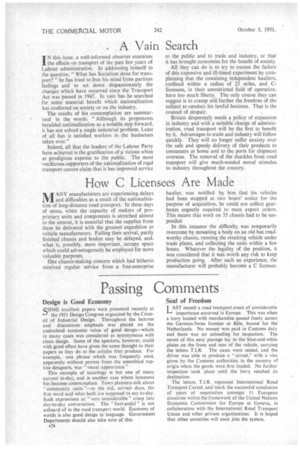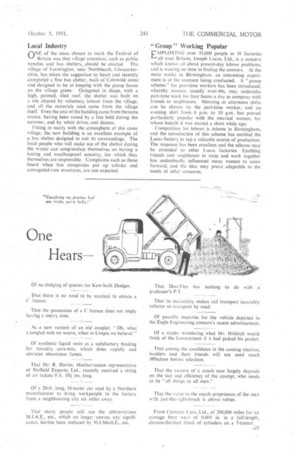Passing Comments
Page 28

Page 29

If you've noticed an error in this article please click here to report it so we can fix it.
Design is Good Economy
SOME excellent papers were presented recently at the 1951 Design Congress organized by the Council of Industrial Design. Throughout the lectures and discussions emphasis was placed on the undoubted economic value of good design—which in many cases was considered as synonymous with clean design. Some of the speakers, however, could with good effect have given the same thought to their papers as they do to the articles they produce. For example, one phrase which was frequently used, apparently without protest from the assembled topline designers, was "visual appearance."
This example of tautology is hut one of many current to-day, and is another case where looseness has become commonplace. Town planners talk about community units "—in the old, correct days, the first word said what both are supposed to say to-day. Such expressions as " very considerable" creep into day-to-day conversation. The "foot-pedal" is not unheard of in the road transport world. •Economy of words is also good design in language, Government Departments should also take note of this.
A26
Seal of Freedom
LAST month a road transport event of considerable importance occurred in Europe. This was when a lorry loaded with merchandise passed freely across the German-Swiss frontier at Bale, bound for the Netherlands. No money was paid in Customs duty and there was no unloading for inspection. The secret of this easy passage lay in the blue-and-white plates on the front and rear of the vehicle, carrying the letters T.1.R. The cases were sealed, and the driver was able to produce a "carnet," with a visa given by the Customs authorities in the country of origin when the goods were first loaded. No further inspection took place until the lorry reached its destination,
The letters T.1.R. represent International Road Transport Carnet, and mark the successful conclusion of years of negotiation amongst 11 European countries within the framework of the United Nations Economic Commission for Europe at Geneva, in collaboration with the International Road Transport Union and other private organizations. It is hoped that other countries will soon join the system. •
Local Industry
nNE of the ideas chosen to mark the Festival of
Britain was that village amenities, such as public benches and bus shelters,, should be erected. The village of Farmington. near Northleach, Gloucestershire, has taken the suggestion to heart and recently completed a fine bus shelter, built of Cotswold stone and designed to be in keeping with the pump house on the village green. Octagonal in shape, with a high, pointed, tiled roof, the shelter was built on a site cleared by voluntary labour from the village, and all the materials usedcame from the village itself. Even the cost of the building came from thesame source, having been raised by a fete held during the summer, and by whist drives and dances.
Fitting in neatly with the atmosphere of this stone village, the new building is an excellent example of a bus shelter designed to suit its surroundings. The local people who will make use of the shelter during the winter can congratulate themselves on having a lasting and weatherproof amenity, for which they themselves are responsible. Complaints such as those heard when bus companies put up tubular and corrugated-iron structures, are not expected.
" Group " Working Popular
EMPLOEMPLOYING over 35,000 people in 18 factories YING over Britain, Joseph Lucas, Ltd.., is a concern which knows all about present-day labour problems, and is wasting no time in finding the answers. At the main works in Birmingham, an interesting experiment is at the moment being conducted. A "group scheme" for part-time workers has been introduced, whereby women, usually over-40s, may undertake part-time work for four hours a day in company with friends or neighbours. Morning or afternoon shifts can be chosen by the part-time worker, and an evening shift from 6 p.m. to 10 p.m. has proved particularly popular with the married women, for whose benefit it was started a short while ago.
Competition for labour is intense in Birmingham, and the introduction of this scheme has enabled the Lucas factory to tap a valuable source of production. The response has been excellent and the scheme may be extended to other Lucas factories. Enabling friends and neighbours to train and work together has undoubtedly influenced many women to come forward, and the idea may prove adaptable to the needs of other concerns.
































































































